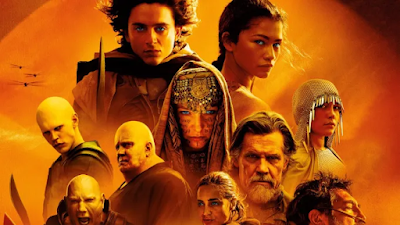We were about 20 minutes into Love Lies Bleeding, when I realized: "Oh. This is True Romance." The latter is a Quentin Tarantino scripted and Tony Scott directed film about two lovers in the midst of darker circumstances than either really wants to engage in, who end up being forced to engage and fight their way out. In the latter film, it's Christian Slater, playing a nerdy comic book store employee, and Patricia Arquette, playing a vagabond turning tricks to try to make it somewhere. In Love Lies Bleeding, it's gym manager Lou (Kristen Stewart) and bodybuilder Jackie (Katy O'Brian) who fall together, pursuing or avoiding their own dreams and then get wrapped up in a scenario that is way beyond what either expected and, of course, have to fight their way out. The one slight difference is the inclusion of some degree of phantasmagoria, which reminded Tricia of Natural Born Killers, which is another good reference to the type and style of film that this is, including the preponderance of gore and the willingness to show sex as the human thing that it is, rather than the Hollywood style that it's often glossed with. But having said all of that largely positive stuff, the obvious rejoinder is that the whole package isn't exactly original, either, other than the central couple of the story being two women, as opposed to the hetero pairings of the other two films.
That's not to say that it was a bad film, because it wasn't. It was pretty entertaining, all things considered, even if the screenplay trended toward shock value more than story depth. But it was the entertainingly familiar, rather than something that grabbed you by the brain and said: "This is new. Pay attention." It's set in the late 90s, as we hear radio announcements about the fall of the Berlin Wall, which seems like a rather arbitrary time period, at first, but later becomes more apparent when the question of readily available steroids becomes a part of the story. I wonder sometimes, as well, if films get set in the recent past to avoid the complication of cell phones and the instant communication that they now provide, which is a good way to blow holes in your story of tension and mystery that would otherwise be sapped by someone picking up their phone and using GPS. (This reminds me of one of my favorite perspectives on William Gibson's Neuromancer, the novel that invented the concept of cyberspace, and how he was able to imagine a world run entirely on an interactive cyber network 50 years from now, complete with self-aware AI, but people were still using pay phones...)
As with many films in this situation, the performances are what carry it. Both Stewart and O'Brian play characters that are human, in that they display poor judgment, rampant emotion, and a predilection for decisions made by passion, rather than reason. Similarly, Ed Harris is great as Lou's shady father, Lou Sr. But the characters themselves give the whiff of being stock-obvious. Jackie is a bodybuilder looking for fame from bog-standard Oklahoma, rather than somewhere more unusual, like a Jersey suburb. Lou Sr. has a fascination with beetles, which serves as nothing other than a detail before a shocking moment right near the end. It doesn't form any part of the character other than as a distraction. Contrast this with Ted Levine's Jame Gumb is Silence of the Lambs, who was fascinated by moths (specifically, Death's-head hawkmoths) because of their inherent transformation from larva to moth, as he was attempting in his transition from male to female. That attraction to bugs reflected the essential nature of the character, whereas in this film, it's just something for the audience to ogle at ("The bug guy?" "Yeah, the bug guy.") Similarly, Lou is the frustrated person who detests both of her parents and doesn't talk about them with anyone if she can help it, but the story eventually pries her story out of her. This is where the screenplay might have let down the talent of the actors involved and the film as as a whole.
The final scene, which involves the aforementioned phantasmagoria, is somewhere between amusing and eyebrow-arching. Yes, we weren't really sure whether our "heroines" would survive or not and that's always good in terms of a story, but when it arcs into the fantastical, we kind of lose the emotion behind their otherwise very real and expected circumstances that led them to this point. You could say that the end of the film is where we arc into romance novel territory, which is a complete departure from Jackie and Lou's relationship to that point (including the sex scenes) and which is commendable, IMO, as far as writing goes, just to throw the audience for a second and get them to sit up and pay attention. But the ending moments can also be seen as maudlin, even if hilarious, and that's when I circle back to questioning why this screenplay seems like so many that have come before it, rather than branching out into its own approach that would make this film stand alone as its own production. So, yeah, worth a watch, but not compelling.















